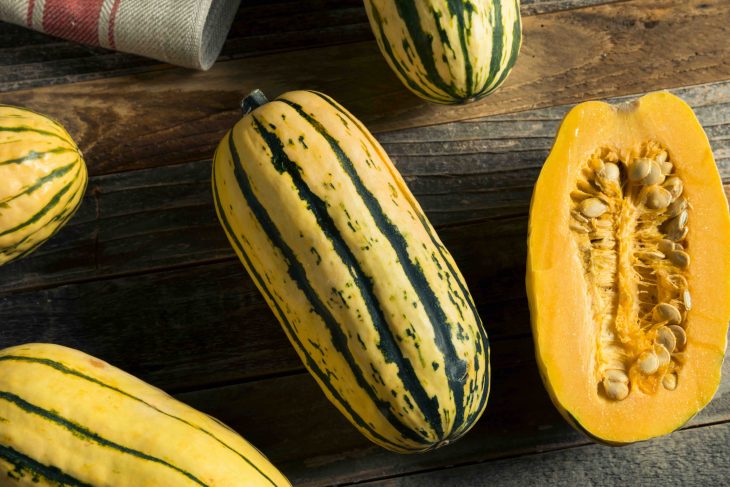
Delicata squash, also known as sweet potato squash, is a delightful winter vegetable that brings warmth and flavor to your plate. Not only is it delicious, but it’s also packed with nutrients that offer various health benefits. In this article, we’ll unveil 10 nutrition facts about delicata squash, exploring its impressive nutritional profile and highlighting the reasons why you should make it a part of your healthy diet.
Abundant in Vitamins A and C
Delicata squash is a great source of vitamins A and C, both essential for maintaining a healthy immune system. Vitamin A promotes good vision, while vitamin C supports collagen production and acts as a powerful antioxidant.
Rich in Dietary Fiber
Fiber is crucial for digestive health, and delicata squash provides a significant amount of it. A one-cup serving of cooked delicata squash contains about 6 grams of dietary fiber, helping to promote regular bowel movements and maintain a healthy gut.
Low in Calories
If you’re watching your calorie intake, delicata squash is a fantastic choice. With only around 40 calories per cup, it allows you to enjoy a generous portion without compromising your weight management goals.
Source of Potassium
Potassium plays a vital role in maintaining healthy blood pressure levels and supporting proper heart function. Delicata squash is a potassium-rich vegetable, providing approximately 400 milligrams of potassium per cup.
Antioxidant Powerhouse
Delicata squash is packed with antioxidants that help protect your cells from damage caused by harmful free radicals. The vibrant orange flesh of delicata squash is an indication of its high beta-carotene content, which is converted to vitamin A in the body.
Promotes Eye Health
With its high levels of vitamin A and beta-carotene, delicata squash is beneficial for maintaining good eye health. These nutrients are known to support vision, particularly in low-light conditions, and may help reduce the risk of age-related eye diseases.
Boosts Heart Health
The combination of fiber, potassium, and antioxidants in delicata squash contributes to heart health. Fiber helps reduce cholesterol levels, while potassium supports healthy blood pressure. Antioxidants protect against oxidative stress, which can lead to cardiovascular issues.
Versatile Culinary Uses

Delicata squash’s delicate flavor and creamy texture make it a versatile ingredient in various dishes. It can be roasted, sautéed, stuffed, or pureed to create soups, stews, casseroles, and even sweet treats like pies and desserts.
Easy to Prepare and Enjoy
One of the perks of delicata squash is its ease of preparation. Unlike other winter squashes, the thin skin of delicata squash is edible, eliminating the need for peeling. Simply slice it, remove the seeds, and cook it to enjoy its deliciousness.
Supports Weight Management
Delicata squash’s high fiber content promotes a feeling of fullness, making it a satisfying addition to your meals. It can help control your appetite and prevent overeating, supporting your weight management efforts.
Conclusion
In conclusion, delicata squash is not only a tasty winter vegetable but also a nutritional powerhouse. From its rich vitamin and mineral content to its fiber and antioxidant properties, delicata squash offers a range of health benefits. So, next time you’re looking for a flavorful and nutritious addition to your meals, consider incorporating the versatile delicata squash and savor its delightful taste.
Frequently Asked Questions (FAQs)
Can I eat the skin of delicata squash?
Yes, the skin of delicata squash is edible and adds a pleasant texture to your dishes. Ensure that you wash the squash thoroughly before cooking.
Can I freeze delicata squash?
Yes, delicata squash can be frozen for later use. Peel and cut it into cubes, blanch the cubes in boiling water for a few minutes, then plunge them into ice water to stop the cooking process. Drain, pat dry, and store in freezer-safe containers or bags.
Are there any allergens associated with delicata squash?
Delicata squash is generally well-tolerated and not a common allergen. However, if you have known allergies to other types of squash, it’s best to consult with a healthcare professional before consuming delicata squash.
How do I know if delicata squash is ripe?
Ripe delicata squash should have a vibrant orange color and feel firm when gently pressed. Avoid squash with soft spots or signs of mold.
Can I use delicata squash seeds for roasting?
Yes, delicata squash seeds can be roasted just like pumpkin seeds. Rinse them, remove any pulp, toss them with olive oil and seasonings of your choice, and roast in the oven until they turn golden brown and crispy.
Was this page helpful?
Our commitment to delivering trustworthy and engaging content is at the heart of what we do. Each fact on our site is contributed by real users like you, bringing a wealth of diverse insights and information. To ensure the highest standards of accuracy and reliability, our dedicated editors meticulously review each submission. This process guarantees that the facts we share are not only fascinating but also credible. Trust in our commitment to quality and authenticity as you explore and learn with us.


